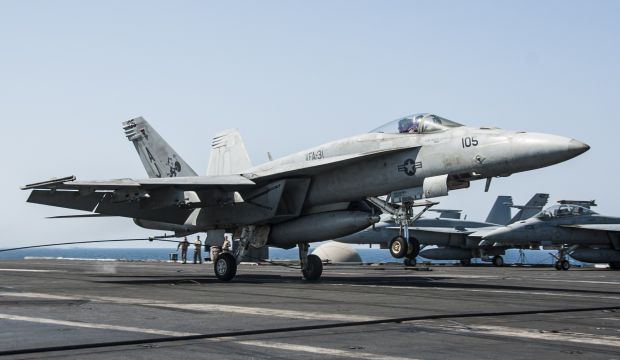
A US Navy jets lands on the USS George HW Bush after conducting strike missions against the Islamic State of Iraq and Syria (ISIS) on September 23, 2014 (AFP Photo/Navy Media Content Services/HO/Mass Communication Specialist 3rd Class Brian Stephens)
Beirut and London, Reuters/Asharq Al-Awsat—US-led forces carried out at least 13 airstrikes in Syria close to the Iraqi border on Wednesday, a second day of targeting Islamic State of Iraq and Syria (ISIS) militants who have seized land on both sides of the frontier, a group that tracks the Syrian war said.
Rami Abdulrahman, who runs the UK-based Syrian Observatory for Human Rights, told Reuters the raids had hit the border town of Albu Kamal and surrounding areas.
The United States with Arab allies launched airstrikes on ISIS in Syria on Tuesday. A spokesman for the US military said those strikes were “only the beginning”.
Albu Kamal, on the main Euphrates River valley highway, is one of the most important border crossings between Iraq and Syria, along a frontier that ISIS wants to erase after seizing territory on both sides and declaring a caliphate.
It links ISIS’s de facto capital Raqqa in Syria with strategic front lines in western Iraq and militant-held territory down the Euphrates to the western and southern outskirts of Baghdad.
Depriving ISIS of the ability to cross the border freely in the Euphrates Valley could be an early strategic objective of the US-led coalition, which aims to defeat the group on both sides of the frontier.
ISIS has exploited its ability to cross the border to score victories on both sides: fighters pouring in from Syria helped seize much of northern Iraq during a lightning advance in June, and weaponry they captured was then sent back to help the group secure more land in Syria.
The area around Albu Kamal has already been the focus of heavy bombing by US-led forces in the first day of their air campaign in eastern Syria. The Observatory said around 22 strikes hit the area on Tuesday.
“The people there, the activists, say they [the strikes] are probably the [international] coalition, not the regime,” Abdulrahman said, referring to the Syrian government. “The strength of the explosions are greater. Like yesterday.”
A militant Islamist fighter in the area said there had been at least nine strikes by “crusader forces” that had hit targets including in an industrial area.
The latest air attacks came a day after US President Barack Obama thanked Jordanian, Emirati, Saudi, Qatari, and Bahraini leaders and officials for joining in the US-led aerial campaign against ISIS.
Representatives of the five Arab states were holding a meeting with US Secretary of State John Kerry on the fringes of the UN General Assembly meeting in New York to discuss cooperation against ISIS, when they were joined by President Obama.
As well as the foreign ministers and ambassadors of the five states, the meeting was attended by King Abdullah of Jordan and Prime Minister Haider Al-Abadi of Iraq.
According to a statement released by the White House, Obama told the gathering: “In addition to His Majesty, King Abdullah, I want to give a special welcome to Prime Minister Abadi and say congratulations to him for his leadership. To our friends from Saudi Arabia, from Bahrain and Qatar, we want to thank you very much for everything that you have done, and the United Arab Emirates as well.”
The president also warned that the struggle against ISIS would be a long one, and that it could not be waged with military force alone, calling on Middle East states to promote religious tolerance and economic opportunities for their young people, to undercut ISIS’s recruitment efforts.
“I just want to say thank you to all of you. This is obviously not the end of an effort, but is rather a beginning. But I’m confident with the kind of partnership that is represented here, that we’ll be able to be successful,” he added.
On Wednesday, Obama is scheduled to address the UN General Assembly on the issue of the US-led strikes on ISIS, as well as convening a meeting of the Security Council. The Council is expected to adopt a resolution calling on all UN member-states to prevent their citizens travelling to Syria or Iraq to join terrorist organizations.

Trackbacks/Pingbacks